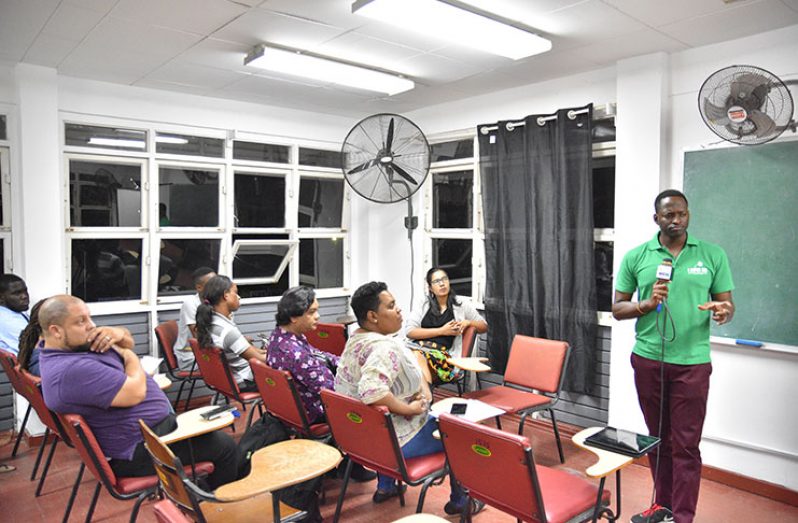ORGANISATIONS in Guyana are seeking to make the lives of transgender individuals easier by effecting changes within the University of Guyana (UG) in the hope of inducing a ripple effect to further influence the country as a whole.
This was revealed during Campus Gyaff on ‘Gender Identity and Social Justice’ hosted by the Guyana Equality Forum (GEF) and the University of Guyana Law Society (UGLS), on Monday.
The event was held in observation of the World Day of Social Justice on Tuesday and featured remarks from Adjunct Professor at the Georgetown Law Human Rights Institute, Fanny Gomez-Lugo; Managing Director of the Society Against Sexual Orientation Discrimination (SASOD), Joel Simpson; and Alessandra Hereman of Key Populations Focal Point at the USAID Advancing Partners & Communities Guyana Project
One of the main changes the organisations, including SASOD, is trying to bring about involves additional considerations for transgender individuals on the university campus.
According to Simpson, the University’s Student Code of Conduct prohibits discrimination on the basis of sexual identification but not on gender identity, which prevents transgender individuals from utilising the restrooms of the gender they identify with.
“The best practice that we recommend is to have gender-neutral washrooms or all-gender bathrooms. So it means that you should be able to go into an individual stall and do your business regardless of what gender you are… we would have to engage in conversations with the university to… remodel so that we have gender-neutral washrooms on campus,” Simpson said.
He added: “If it [gender identity] is in the official university policy, then you have a standard at which you can hold people accountable… there is nothing in the university policy or statutes to prohibit transphobic discrimination.”
Meanwhile, Gomez-Lugo said many persons do not realise that there is something called “hetero-sexual privilege” which grants straight individuals rights while discriminating against those who divert from this.
UNHINDERED
“We can enter any bathroom we want and in the morning when we get dressed, we don’t have to think about things that we have to wear or the make-up that we have to use and how that will affect going to the bathroom,” she said.
Gomez-Lugo add: “A lot of transgender friends that I have suffer from a wide variety of infections regarding not going to the bathroom and holding it in, or perhaps they are dehydrated because they can’t drink enough fluids because they have to time their going to the bathroom to times when people don’t go or have to go to further bathrooms to evade discrimination.”
Simpson says the conversations have begun with the student population and groups on campus but will soon move on to the administrative levels, as the organisations hope to eventually effectuate changes in the university’s policies.
“I think the young people at the university campus are being educated and what we know about homophobia is that it stems from ignorance,” Simpson said.
He contended: “The more that we do sessions like these to educate people, and the more the students who study sociology, law, and medical sciences understand and appreciate gender and sexual diversity… we will change hearts and minds.”
Gomez-Lugo also touched on the works of the Inter-American Commission on Human Rights (IACHR), discrimination and violence against transgenders, the criminalisation of private, consensual same-sex relations and state obligations.
She said, too, that local laws do not allow for a change in gender on the National Identification (ID) card which does not cater for persons who travel across genders or are gender fluid.
On another note, SASOD has an appellate jurisdiction before the Caribbean Court of Justice (CCJ) following its dismissal at the Court of Appeal last year, which upheld the decision of former Chief Justice Ian Chang that cross-dressing is allowed once not done for “improper purposes”.
SASOD argues that the cross-dressing law found in Section 153 (1) (xlvii) of the Summary Jurisdiction (Offences) Act 1893, is inconsistent with the Constitution of Guyana.
Simpson hopes for a swift judgement as the government establishes a permanent Law Reform Commission to reform and modernise Guyana’s laws to include changes in the laws against cross-dressing.




.jpg)










